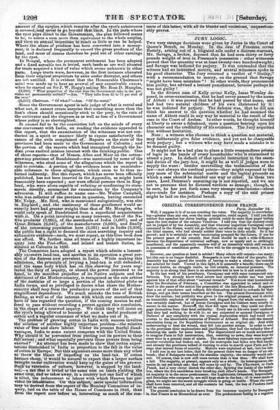JURY LOGIC.
Two very strange decisions were given by Juries in the Court of Queen's Bench, on Monday. In the case of Freeman versus Battely, arising out of a litigated sale under a distress-warrant, Mr. Savage, a broker, deposed that he had seen thirty or forty pounds weight of iron in Freeman's possession : other witnesses proved that the quantity was at least twenty-two hundredweight ; and Savage was indicted for perjury. It was contended that the witness had no interested motive, and several witnesses spoke to his good character. The Jury returned a verdict of " Guilty," with a recommendation to mercy, on the ground that Savage "might have been mistaken " ! In other words, they pronounced him guilty, but advised a lenient punishment, because perhaps he was not guilty ! Mr. Savage, a broker, deposed that he had seen thirty or forty pounds weight of iron in Freeman's possession : other witnesses proved that the quantity was at least twenty-two hundredweight ; and Savage was indicted for perjury. It was contended that the witness had no interested motive, and several witnesses spoke to his good character. The Jury returned a verdict of " Guilty," with a recommendation to mercy, on the ground that Savage "might have been mistaken " ! In other words, they pronounced him guilty, but advised a lenient punishment, because perhaps he was not guilty !
In the divorce case of Kelly versus Kelly, Isaac Worsley de-
posed, in cross-examination, that he had never passed by the name of Abbott : it was proved that he had passed by that name, and had had two natural children of his own christened by it : he was indicted for perjury. The defence was, that be did not think his answer to the question whether be had assumed the name of Abbott could in any way be material to the result of the case in the Court of Arches. In other words, he thought himself at liberty to swear a falsehood, upon a question bearing upon his character and the credibility of his evidence. The Jury acquitted him without hesitation.
Note : a witness who chooses to think a question not material, may deliberately give false evidence, and yet not be chargeable with perjury ; but a witness who may have made a mistake is to be deemed guilty.
It might not be a bad plan to place a little Compendious primer of logic in the hands of every householder who is summoned to attend a jury. In default of that special instruction in the essen- tial duties of the jury-box, it might be as well if judges were to supply the want : besides unravelling the technicalities of the law—not always the cardinal points—they might expound to the jury more of the substantial merits and the logical grounds on which a case should be decided one way or other. In these two cases, Lord.Denman's summing-up is not reported, and we are not to presume that he dictated verdicts so strange ; though, to be sure, he has put forth some very strange conclusions—about slave-trade for instance. Perhaps a copy of the said primer might be laid on the judicial bench.


























 Previous page
Previous page